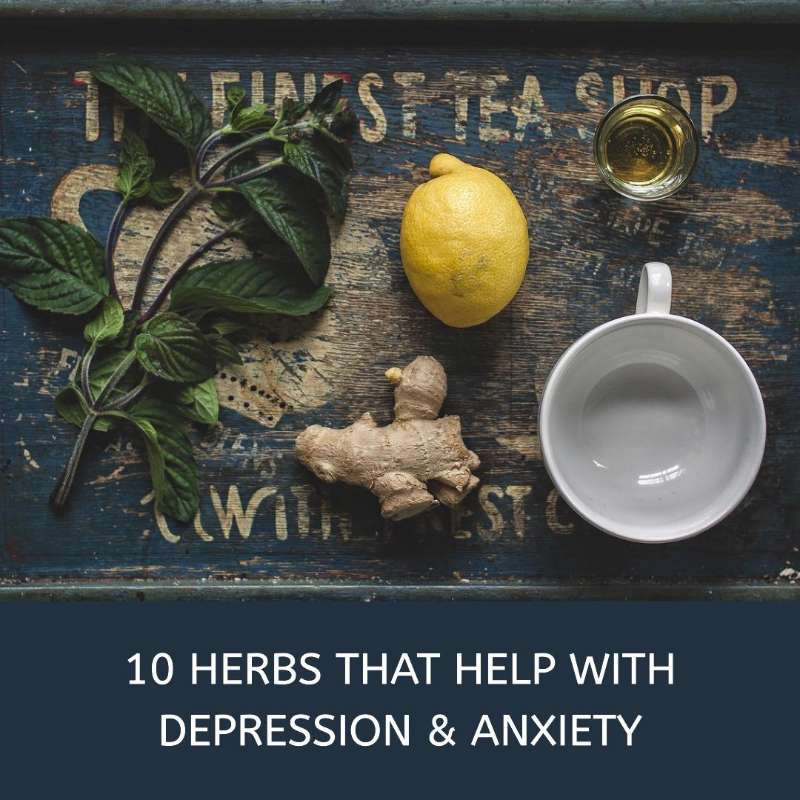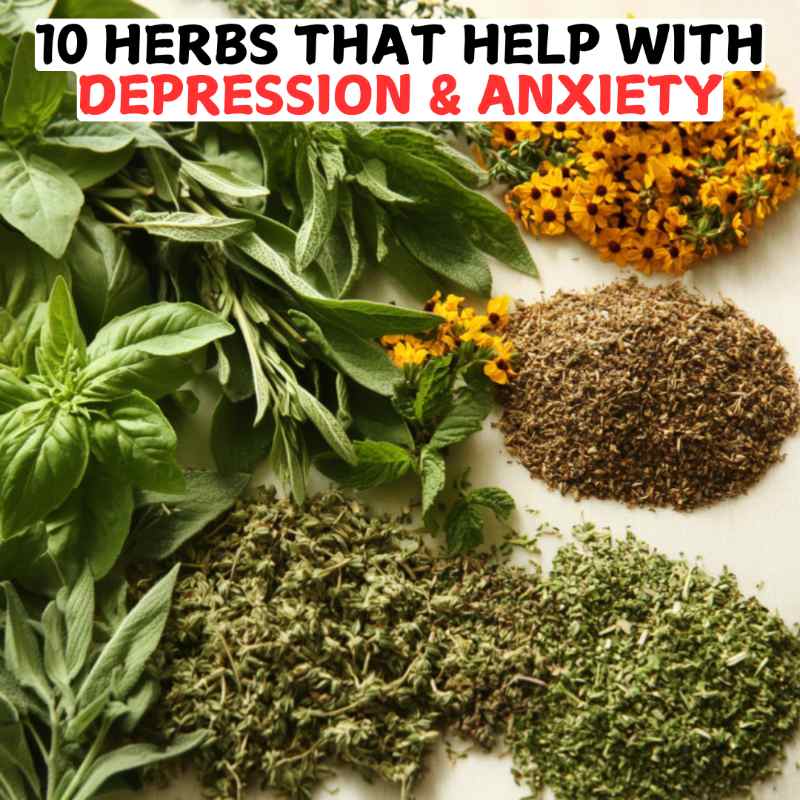10 Herbs That Help With Depression & Anxiety

Make sure to like Living Green and Frugally on Facebook, Shop at Amazon to help support my site and explore our PINTEREST BOARDS for innovative ways you can become self-sufficient.
In today’s fast-paced world, the prevalence of depression and anxiety has become increasingly common. While therapy and medication are often recommended, some individuals seek natural remedies to complement their treatment or as an alternative. Among these natural options, herbs have garnered attention for their potential to alleviate symptoms of depression and anxiety. Below are five herbs renowned for their calming and mood-lifting properties:
Rhodiola (Rhodiola rosea):
Rhodiola, also known as golden root, is an adaptogenic herb native to mountainous regions of Europe and Asia. It has been used traditionally to enhance resilience to stress and improve mental and physical performance. Rhodiola contains bioactive compounds like rosavin, salidroside, and tyrosol, which are believed to modulate stress response pathways in the body. Rhodiola supplements are commonly available in capsule or tincture form.
Typically, a dosage of 200-600mg per day of standardized extract (containing 3% rosavins and 1% salidroside) is recommended for alleviating symptoms of stress, anxiety, and fatigue.
View this post on Instagram
Lemon Balm (Melissa officinalis):
Lemon balm, a member of the mint family, has a pleasant lemony scent and is prized for its calming properties. It contains compounds such as rosmarinic acid and flavonoids, which have been shown to possess anxiolytic and mood-stabilizing effects.
Lemon balm can be consumed as a tea, taken in capsule form, or used as an essential oil for aromatherapy. To make lemon balm tea, steep 1-2 teaspoons of dried lemon balm leaves in hot water for 5-10 minutes, then strain and enjoy.
View this post on Instagram
Holy Basil (Ocimum sanctum):
Holy basil, also known as tulsi, is revered in Ayurvedic medicine for its adaptogenic and stress-relieving properties. It contains compounds like eugenol, rosmarinic acid, and ocimumosides, which help modulate the stress response and promote relaxation. Holy basil can be consumed as a tea, taken in capsule form, or used fresh in cooking.
To make holy basil tea, steep 1-2 teaspoons of dried holy basil leaves in hot water for 5-10 minutes, then strain and sip slowly.
View this post on Instagram
Valerian (Valeriana officinalis):
Valerian root has been used for centuries as a natural remedy for insomnia and anxiety. It contains compounds such as valerenic acid and valeramide, which exert sedative and anxiolytic effects by enhancing the activity of GABA in the brain.
Valerian supplements are available in capsule or tincture form. For insomnia, take 300-600mg of valerian root extract 30 minutes to 2 hours before bedtime. For anxiety, take 200-400mg up to three times daily, or as directed by a healthcare professional.
View this post on Instagram
Ginkgo Biloba (Ginkgo biloba):
Ginkgo biloba, derived from the leaves of the Ginkgo tree, is renowned for its cognitive-enhancing properties and its ability to improve mood and reduce symptoms of anxiety. It contains flavonoids and terpenoids, which have antioxidant and neuroprotective effects.
Ginkgo supplements are available in capsule or liquid extract form. A typical dosage for improving mood and reducing anxiety ranges from 120-240mg per day, taken in divided doses with meals.
View this post on Instagram
Bonus
- St. John’s Wort (Hypericum perforatum): Often likened to a natural antidepressant, St. John’s Wort contains compounds believed to influence neurotransmitters associated with mood regulation. It’s typically consumed as a standardized extract, but caution is advised due to potential interactions with medications.
- Lavender (Lavandula angustifolia): The calming scent of lavender can soothe frazzled nerves and promote relaxation. It’s commonly used in aromatherapy, but it’s essential to dilute essential oils properly and avoid ingestion without professional guidance.
- Chamomile (Matricaria chamomilla): Chamomile’s gentle sedative effects make it a popular choice for relieving anxiety and promoting sleep. Enjoy it as a soothing tea, but consult a healthcare professional, especially if you have allergies or are pregnant.
- Ashwagandha (Withania somnifera): As an adaptogen, ashwagandha helps the body adapt to stress and may alleviate symptoms of anxiety. However, dosage and duration of use should be supervised, especially if you have underlying health conditions.
- Passionflower (Passiflora incarnata): Passionflower’s calming properties make it useful for managing anxiety and improving sleep quality. Use it as a tea or supplement, but seek professional advice if you’re pregnant or taking sedatives.
When incorporating these herbs into your routine, it’s essential to start with low doses and gradually increase as needed while monitoring for any adverse effects. Additionally, it’s advisable to consult with a healthcare professional, especially if you’re pregnant, nursing, or taking medications, to ensure safety and efficacy.
Integrating these herbs into a holistic approach to mental health, which may include therapy, lifestyle modifications, and other interventions, can help promote emotional well-being and resilience against stress.
Medical Disclaimer: While herbs offer potential benefits for mental well-being, they are not a substitute for professional medical advice, diagnosis, or treatment. If you’re experiencing symptoms of depression or anxiety, it’s crucial to seek guidance from a qualified healthcare professional. They can provide personalized recommendations, monitor your progress, and ensure safe integration with any existing treatments or medications. Additionally, some herbs may interact with medications or exacerbate certain health conditions, so always consult with a healthcare provider before starting any new supplement regimen.
Incorporating herbs into a holistic approach to mental health, alongside therapy, lifestyle modifications, and other interventions, can contribute to overall well-being and resilience against stress. However, individual responses may vary, and what works for one person may not work for another. Be patient, stay informed, and prioritize your mental health with the support of qualified professionals.
Pin for Later
